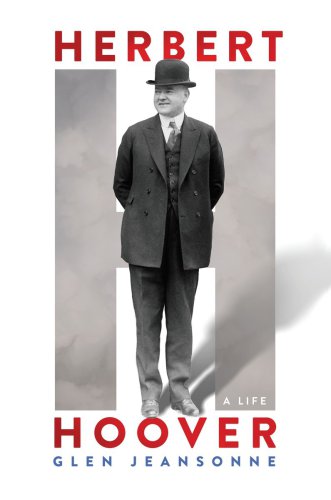
Herbert Hoover
A Life
کتاب های مرتبط
- اطلاعات
- نقد و بررسی
- دیدگاه کاربران
نقد و بررسی

August 8, 2016
Drawing deeply on Hoover’s archives and previous biographies, Jeansonne (The Life of Herbert Hoover: Fighting Quaker, 1928–1933), emeritus professor of history at the University of Wisconsin–Milwaukee, energetically paints a colorful, revisionist portrait of America’s oft-maligned 31st president. Jeansonne chronicles Hoover’s journey from his Iowa childhood through his years at Stanford, his stints as a successful mining engineer overseas, his humanitarian work helping American refugees stranded in Europe in the early days of WWI, and his election as president in 1928. Soon afterward, the American economy started its spiral into the years of the Great Depression. Rather than fashion a government bureaucracy that would remain in place after the crisis, Hoover supported decentralized programs that operated at a grassroots level. In spite of Hoover’s efforts, Jeansonne points out, political critics and the public blamed Hoover for the crash and the subsequent economic hardships, and he lost the 1932 presidential election to Franklin D. Roosevelt. Returning to his California home, Hoover was often mocked for his work in the White House, but between defeat and his death in October 1964, Hoover turned his attention to writing, political diplomacy, and humanitarian work. Jeansonne’s detailed account presents a novel vision of Hoover and his place in American life. Agent: Bridget Matzie, Zachary Shuster Harmsworth.

Herbert Hoover (1874-1964) as a lifelong champion of true GOP ideals.In a thorough, overly sympathetic biography, Jeansonne (Emeritus, History/Univ. of Wisconsin-Milwaukee) asserts that the Great Humanitarian got a bad rap serving as president during the outbreak of the Great Depression. The author of an earlier work on Hoover (The Life of Herbert Hoover, Fighting Quaker: 1928-1935, 2012), as well as other books on 20th-century history, Jeansonne finds that Hoover cultivated his "pure heart" as a small-town Iowa Quaker and orphan who grew up in the great outdoors, hence his love of nature and tendency to trust his own instincts. A well-regarded engineer after his Stanford education and married to a professional geologist, Hoover became hugely wealthy from Burma mining interests by age 40. With the onset of World War I, he dedicated his energies to helping feed the starving people of Belgium, among others, under President Woodrow Wilson, and later as commerce secretary under President Warren Harding and his successor, Calvin Coolidge. With his national following at the grass-roots level helping propel him into the White House in 1928, Hoover was a strong proponent of women's suffrage, abided by Prohibition, and worked on disarming the country for a peaceful future. However, his first eight months of "whirlwind reform" were quickly overshadowed by such economic woes as farm relief--i.e., the vilified Smoot-Hawley Tariff, which the author concedes Hoover would have been "wiser" to have vetoed. Rather than anything Hoover did or could have done, argues Jeansonne, the stock market crash ultimately did him in. Indeed, Hoover created many measures Franklin Roosevelt would implement, such as large-scale public works. Despite Hoover's "prophetic" words, he was largely blamed for the economic crash, and he spent much of the rest of his career excoriating the New Deal and advocating for keeping the U.S. out of World War II. A hagiographic survey of an activist president agitating on the wrong side of history. A decent resource, but readers are encouraged to also consult Charles Rappleye's Herbert Hoover in the White House (2016). COPYRIGHT(1) Kirkus Reviews, ALL RIGHTS RESERVED.

September 1, 2016
Jeansonne (history, Univ. of Wisconsin-Milwaukee; The Life of Herbert Hoover) takes on the formidable task of making stereotypically dour Herbert Hoover (1874-1964) appear winsome. By turns a frontier orphan, engineer, philanthropist, self-made millionaire, world traveler, and avid angler, Hoover served as secretary of commerce in the 1920s and chief executive during the Great Depression. As a cabinet member he was among the first to appear on an experimental TV transmission. With this biography, Jeansonne follows in the path led by historians such as George H. Nash, Gary Dean Best, and William Leuchtenberg, significantly mining archives at the Herbert Hoover Presidential Library and Museum and primary sources at the Hoover Institution. The wide-ranging studies on aspects of the reflective Hoover, whose ideology sometimes overcame his pragmatism, and whose politics ranged from progressivism to conservatism, are revealing of his postpresidency career as a prolific author. VERDICT Jeansonne judiciously and luminously succeeds in making Hoover's beliefs in efficiency, individualism, nationalism, volunteerism, and intervention overseas better known today, rescuing him from the erroneous image of an indifferent, static public figure.--Frederick J. Augustyn Jr., Lib. of Congress, Washington, DC
Copyright 2016 Library Journal, LLC Used with permission.

Starred review from September 15, 2016
Hoover bears the dismal historical reputation as the American president who did very little to arrest the economic collapse after the 1929 Wall Street crash; instead, as the thread of criticism generally runs, he assumed the 1920s Republican position of hands-off to let the economy seek its own path to recovery. Jeansonne pushes through this veneer of criticism to conclude that the Depression would have crippled any chief executive, and further, An incumbent elected in 1928 would likely have been defeated in 1932. He sees Hoover as one of the most extraordinary Americans of modern times and writes that he was the most versatile American since Benjamin Franklin. The author's well-expressed supporting arguments result in a brilliant reconstruction of Hoover's long and widely effective pre-presidency career, which included success as a mining engineer and a highly applauded turn at public service in the form of relief workfeeding millions of people after WWI and, in Jeansonne's estimation, functioning as one of the country's best commerce secretaries (in the cabinets of presidents Harding and Coolidge). This biography is rounded out by views of his devotion to his wife and children. And as far as the Depression? Hoover does not deserve to be pilloried as the scapegoat. (Reprinted with permission of Booklist, copyright 2016, American Library Association.)

























دیدگاه کاربران